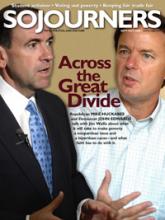Around this time four years ago, I found myself having conversations with Christians of many different political and theological stripes about why they were planning to sit out the 2004 election. Several prominent Christian scholars published thoughtful essays arguing that, as Alasdair MacIntyre put it, “the way to vote against the system is not to vote.”
I was, to put it simply, gobsmacked. Not voting? When so much was at stake? This struck me as irresponsible and perfectionist. I felt my interlocutors were saying, in effect, “Because I disagree with both candidates on some core issues, I will excuse myself from the messy contradictions of our electoral politics—but I will still, daily, reap all the benefits of being a U.S. citizen.” At the same time, I understood my friends’ dilemma: If voting is one way to realize the Christian’s responsibility to witness, then voting for a candidate who holds views that sharply clash with yours and those of your church community is difficult. Refusing to vote, in fact, is taken to be a witness itself.
This election season finds many of us having the same conversations. Some of the more thoughtful and provocative contributions to that conversation may be found in the slim volume Electing Not to Vote: Christian Reflections on Reasons for Not Voting, edited by Ted Lewis. The nine essays included here—which are largely concerned with presidential elections and over which John Howard Yoder unsurprisingly casts a long shadow—raise a good question: When are the options so bad, and an electoral system so flawed, that Christians cannot in good conscience participate?
Read the Full Article
